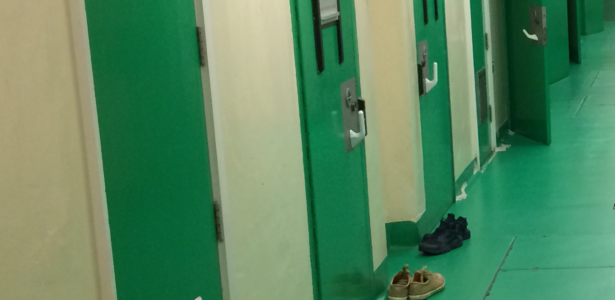Volunteers’ vital role in police cells

Few of us get the chance to sit in a police cell,but then few of us would wish to.
The cell at Harrogate Police Station I ‘tried out’ – briefly – was civilised but spartan, as is to be expected.
Something was unusual about this white faceless room, however.
The fixtures and fittings all looked incapable of being dismantled.
In fact, everything about the windowless cell I was inside temporarily had clearly been thought out in advance to a meticulous degree.
Safety is clearly a top priority at all times for detainees and police officers, the aim to avoid harm coming to either party.
It’s an approach duplicated in every corner of Harrogate’s state-of-the-art ‘new’ police station, if there were any corners, for the walls are mostly rounded, again for safety reasons.
Opened five years ago at Beckwith Head Road near RHS Harlow Carr at a cost of £18m, nothing has been left to chance in its 16-cell custody block built to Home Office standards.
In total there are 130 CCTV cameras in place in the rooms and corriders leading from Harrogate Police Station’s central hub.
But eyes and ears are human, too, in this futuristic new system.
In 2002, the Government introduced the requirement for independent custody visitors to be allowed to turn up unannounced at police stations across the UK.
I’m here because I’ve been lucky enough to be given a rare tour round the building in the company of a police officer and two of Harrogate’s unpaid custody visitors.
Volunteering to be an ICV is to gain a privileged insight into life inside a police station but it’s far from an academic role.
The principal mission of these unpaid members of the local community, who must have no other direct involvement in the criminal justice system, is a serious one – to check on the welfare of detainees in custody.
Having been arrested, the detainee may be isolated and vulnerable, possibly confused, perhaps guilty, perhaps not.
In all situations, however, it’s the job of an ICV to assess the conditions in which new arrivals to a police cell are held and whether their rights and entitlements are being met under the Police and Criminal Evidence Act 1984 (PACE), Code C and Code H.
Run from the office of the Police and Crime Commissioner for North Yorkshire, who is required by law to run an ICV scheme, the part-time life of an ICV means lots of form filling and the filing of reports – all in the cause of ensuring the protection of detainees and to demonstrate that ‘transparency’ is a real part of England’s law and order system.
And, if anything is found to be amiss or wanting during a visit, the police are duty-bound to act on it.
Many of the detainees in Harrogate Police Station turn out to be there through problems of drink and drugs and mental health, a situation duplicated much of the time nationwide.
In theory major suspects in terrorist cases can pass through the hands of Harrogate Police Station but, so far, that’s been the case in theory only.
Much of the ‘traffic’ still happens at weekends but, even then, it’s a rare occasion when all of Harrogate’s 16 cells are full.
But no one can ever say what will happen in advance.
As well as the satisfaction of helping others, there are also potential dangers involved for volunteers.
A police officer is always nearby during interviews and the act of shaking hands is a major ‘no no’.
Verbal abuse by a detainee is justification alone for terminating the interview.
But an element of risk remains however thorough the precautions.
Ian Fithian-Franks, an ICV coordinnator based at the office of the Police and Crime Commissioner for North Yorkshire, says the input by ICVs is valued by both detainees and the police.
He said: “Some of the individuals detained are violently aggressive, intoxicated or on drugs and can be extremely difficult to bring under control safely and without injury to officers.
“Quite often the police are called upon to detain very vulnerable people for their own safety until an appropriate place can be found for them within the NHS or privately run organisations.”
“But confrontation between detainees and ICVs is the exception rather than the rule.
“Most detainees interviewed by ICVs appreciate our independence and impartiality as do the Police Custody staff.”
ICVs are allowed to speak to anyone being detained at a police station, unless a police inspector – or higher rank – believes that access would place the custody visitors in danger or would interfere with the process of justice.
At the moment, the Harrogate area has six ICVs, out of a total of 48 across North Yorkshire, based in York, Scarborough and Northallerton.
With ICV visits at Harrogate Police Station happening in pairs once a week, the community-spirited volunteers have their work cut out.
Ideally, 12 are required which is why North Yorkshire’s Police and Crime Commissioner, is appealing for more volunteers.
Julia Mulligan said: “Independent custody visiting is a vital element of the work of the Office of the Police and Crime Commissioner in ensuring the police service is open and accountable to the people it serves.
“It’s important work and I would encourage anyone living in North Yorkshire who is looking for a challenging volunteering opportunity to consider becoming an ICV.”
Real-life tales: what’s it like to be an ICV?
By Harrogate Police Station ICV Doug Mills
Meeting the detainee
“The reason for being there is to see that the welfare of each detainee being held is in an appropriate manner and that their rights and entitlements are being met.
“When interviewing a detainee, we never know who they are or why they are there because it’s vital we are non-judgemental.
“When we meet them, many of them have not been convicted or even charged.
“We also have to get their permission before we can talk to them.
“A minimum of one hour is usually necessary to inspect the suite, see if the custody officer has any issues that need to be mentioned so that an ICV’s report can be completed, copies of which are sent to the OPCC Scheme Administrator and the Inspector responsible for the custody suite.”
Risks in the role
“The booking in of a detainee is the most likely time for confrontation to arise and I have only witnessed one occasion where officers have had to calm a person down.
“Generally ICVs would only observe the booking-in at a distance.
“In eight years of being an ICV I have never been threatened or have had concern for my own welfare or that of my colleague.”
“In any case, the police are fully trained to restrain a disruptive person and I am confident that they would able to deal with a problem should it arise.
“If a detainee wishes to see us it is standard procedure not to shake hands and to request the detainee to sit.
“We would never interview the detainee between us and the door which is always open with the Detention Officer being within close proximity.
“There have been instances where the Custody Sergeant advised on someone that might be potentially dangerous.
“In such situations we would, perhaps, just view the person through the door hatch.”
Satisfaction in the role
“I sincerely hope that our role is seen as a benefit to the wider community.
“You really do feel that you are helping. Some detainees may not want to speak to you but the ones that need you make it all worthwhile.
“I can say that any newly-appointed ICV would get the full support of more experienced like-minded panel members during a probationary period to ensure they get similar satisfaction from the role.”
Do you have what it takes?
If you’re looking for a volunteering opportunity that will challenge you, give you an insight into the criminal justice system and ensure the protection of detainees in custody suites? Look no further, we have the role for you.
To apply, or for more information
Published September 2017
